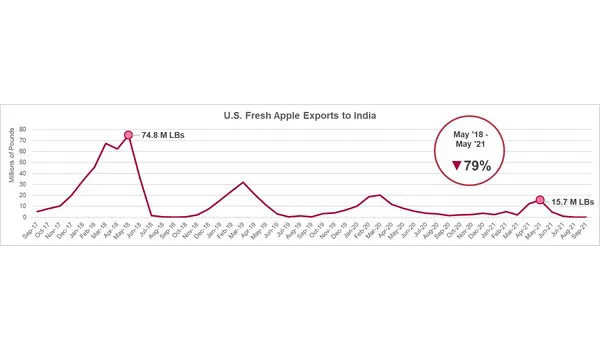Following the start to agricultural trade negotiations last week at the U.S.-India Trade Policy Forum in New Delhi, the U.S. Apple Association says more needs to be done to ensure U.S. apple growers can once again compete in the Indian market.
Since the U.S. imposed tariffs on steel and aluminum imports from India in 2018—resulting in retaliatory tariffs by India on U.S. apples and other exports—total tariffs on U.S. apples have reached 70 percent and India’s purchases of U.S. apples have plummeted 79 percent.
“We appreciate U.S. Trade Representative Katherine Tai’s efforts to kick start tricky agricultural trade negotiations with India. She has our full support,” said Jim Bair, USApple president and CEO. “But for U.S. apple growers to fully get back into that market, the U.S. government needs to remove tariffs on steel and aluminum from India so that India will remove its tariffs on apples.”
 Development of US apple exports to India. Source: U.S. Apple Association; USDA, Foreign Agricultural Service.
Development of US apple exports to India. Source: U.S. Apple Association; USDA, Foreign Agricultural Service.
A growing market was ruined
“The 20 percent retaliatory tariff added to U.S. fresh apples effectively ruined a growing and lucrative market. All apples imported into India regardless of origin have a 50 percent tariff, apples from the USA have a total of 70 percent. The tariff is calculated using the delivered value of the fruit so all transportation costs are included,” says Steve Reinholt, export sales manager at Starr Ranch Growers in Wenatchee, WA. “During the pandemic we have seen our freight costs increase substantially. Every dollar in additional freight adds $1.20 to the cost to the consumer.”
In most years, U.S. apple growers export one-third of their crop, valued at about $1 billion. Prior to India’s retaliatory tariffs taking hold it was the second largest market for U.S. apple growers and was quickly growing.
“U.S. growers were innocent bystanders at a fight that didn’t involve them,” said Bair. “Up until the U.S. imposed steel and aluminum tariffs on India, we were competing and winning in that market.”
Reinholt adds that U.S. growers aren’t asking for special treatment. “Instead, just that all apple producing regions be on a level playing field. Let the consumers decide what they want to buy without artificial interference by either of our governments,” he says.
 For more information:
For more information:
Tracy Grondine
U.S. Apple Association
Tel: +1 (703) 442-8850
tgrondine@usapple.org
www.usapple.org
Steve Reinholt Starr Ranch Growers
Starr Ranch Growers
Tel: +1 (509) 663 2191
sreinholt@oneonta.com
www.starranch.com
